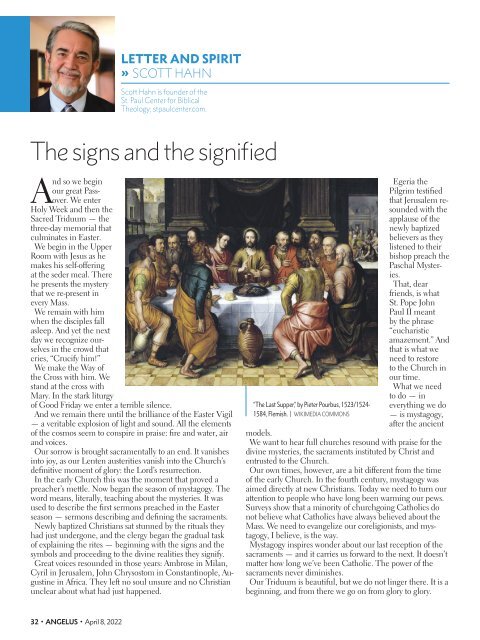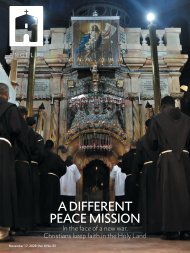Angelus News | April 8, 2022 | Vol. 7 No. 7
On the cover: The notion of the “metaverse,” touted by tech executives like Facebook’s Mark Zuckerberg, is no longer a far-off idea. In fact, we may be gradually entering it through our growing reliance on gadgets and the internet to get through daily life. On Page 12, Elise Ureneck looks into where the metaverse wants to take us and whether people of faith should resist or try to shape a world that isn’t totally “real.”
On the cover: The notion of the “metaverse,” touted by tech executives like Facebook’s Mark Zuckerberg, is no longer a far-off idea. In fact, we may be gradually entering it through our growing reliance on gadgets and the internet to get through daily life. On Page 12, Elise Ureneck looks into where the metaverse wants to take us and whether people of faith should resist or try to shape a world that isn’t totally “real.”
Create successful ePaper yourself
Turn your PDF publications into a flip-book with our unique Google optimized e-Paper software.
LETTER AND SPIRIT<br />
SCOTT HAHN<br />
Scott Hahn is founder of the<br />
St. Paul Center for Biblical<br />
Theology; stpaulcenter.com.<br />
The signs and the signified<br />
And so we begin<br />
our great Passover.<br />
We enter<br />
Holy Week and then the<br />
Sacred Triduum — the<br />
three-day memorial that<br />
culminates in Easter.<br />
We begin in the Upper<br />
Room with Jesus as he<br />
makes his self-offering<br />
at the seder meal. There<br />
he presents the mystery<br />
that we re-present in<br />
every Mass.<br />
We remain with him<br />
when the disciples fall<br />
asleep. And yet the next<br />
day we recognize ourselves<br />
in the crowd that<br />
cries, “Crucify him!”<br />
We make the Way of<br />
the Cross with him. We<br />
stand at the cross with<br />
Mary. In the stark liturgy<br />
of Good Friday we enter a terrible silence.<br />
And we remain there until the brilliance of the Easter Vigil<br />
— a veritable explosion of light and sound. All the elements<br />
of the cosmos seem to conspire in praise: fire and water, air<br />
and voices.<br />
Our sorrow is brought sacramentally to an end. It vanishes<br />
into joy, as our Lenten austerities vanish into the Church’s<br />
definitive moment of glory: the Lord’s resurrection.<br />
In the early Church this was the moment that proved a<br />
preacher’s mettle. <strong>No</strong>w began the season of mystagogy. The<br />
word means, literally, teaching about the mysteries. It was<br />
used to describe the first sermons preached in the Easter<br />
season — sermons describing and defining the sacraments.<br />
Newly baptized Christians sat stunned by the rituals they<br />
had just undergone, and the clergy began the gradual task<br />
of explaining the rites — beginning with the signs and the<br />
symbols and proceeding to the divine realities they signify.<br />
Great voices resounded in those years: Ambrose in Milan,<br />
Cyril in Jerusalem, John Chrysostom in Constantinople, Augustine<br />
in Africa. They left no soul unsure and no Christian<br />
unclear about what had just happened.<br />
“The Last Supper,” by Pieter Pourbus, 1523/1524-<br />
1584, Flemish. | WIKIMEDIA COMMONS<br />
Egeria the<br />
Pilgrim testified<br />
that Jerusalem resounded<br />
with the<br />
applause of the<br />
newly baptized<br />
believers as they<br />
listened to their<br />
bishop preach the<br />
Paschal Mysteries.<br />
That, dear<br />
friends, is what<br />
St. Pope John<br />
Paul II meant<br />
by the phrase<br />
“eucharistic<br />
amazement.” And<br />
that is what we<br />
need to restore<br />
to the Church in<br />
our time.<br />
What we need<br />
to do — in<br />
everything we do<br />
— is mystagogy,<br />
after the ancient<br />
models.<br />
We want to hear full churches resound with praise for the<br />
divine mysteries, the sacraments instituted by Christ and<br />
entrusted to the Church.<br />
Our own times, however, are a bit different from the time<br />
of the early Church. In the fourth century, mystagogy was<br />
aimed directly at new Christians. Today we need to turn our<br />
attention to people who have long been warming our pews.<br />
Surveys show that a minority of churchgoing Catholics do<br />
not believe what Catholics have always believed about the<br />
Mass. We need to evangelize our coreligionists, and mystagogy,<br />
I believe, is the way.<br />
Mystagogy inspires wonder about our last reception of the<br />
sacraments — and it carries us forward to the next. It doesn’t<br />
matter how long we’ve been Catholic. The power of the<br />
sacraments never diminishes.<br />
Our Triduum is beautiful, but we do not linger there. It is a<br />
beginning, and from there we go on from glory to glory.<br />
32 • ANGELUS • <strong>April</strong> 8, <strong>2022</strong>


















